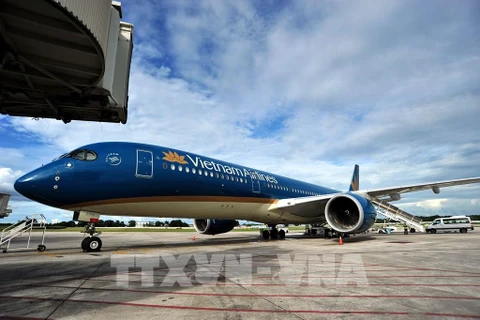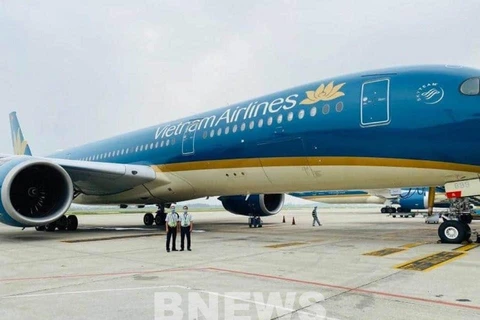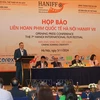 Labourers join a Korean language contest to be sent to work in the Republic of Korea (RoK). (Photo: VietnamPlus)
Labourers join a Korean language contest to be sent to work in the Republic of Korea (RoK). (Photo: VietnamPlus) Hanoi (VNA) – The Ministry of Labour, Invalids and Social Affairs (MoLISA) have drawn up plans and solutions to select, send and manage labourers working abroad given complex developments of the COVID-19 pandemic.
Last year, the ministry revised down the targeted number of Vietnamese contract workers, from 130,000 to 70,000, due to the pandemic. It has continued to sketch up plans for sending workers abroad this year amidst the unpredictable developments of the disease.
Failing to reach the set targets
The spread of the pandemic hindered Vietnam’s efforts in sending workers abroad last year.
According to Ha Xuan Tung, Director of the ministry’s Centre for Overseas Labour, the RoK – one of the largest export labour markets of Vietnam – has yet to resume the reception of workers from the Southeast Asian nation. Meanwhile, Japan has opened its door for a limited number.
As a result, three out of the five relevant programmes launched by the centre have failed to meet the set targets, he said, adding that the programme on sending technical apprentices to Japan (IM Japan) completed only 48.6 percent of the set target, and similar programmes for dispatching Vietnamese guest workers to the RoK (EPS) and Taiwan (China) reached 7.45 percent and 5 percent, respectively.
In addition, there are a large number of Vietnamese employees who have labour contracts expired and have been stranded in foreign countries, while fewer people have registered to work abroad due to pandemic fears.
Given this, the centre has closely coordinated with partners and relevant agencies in managing and supporting them, thus protecting their legal rights and interests, Tung said.
Notably, it has stepped up the application of information technology, including Colab SOS – an application used to connect Vietnamese guest workers, according to the official.
Up to 8,220 employees have set up the app, and the centre has provided assistance for 322 people through it, he said.
Two scenarios built
Deputy Minister of Labour, Invalids and Social Affairs Le Tan Dung said the centre has taken synchronous and drastic measures against COVID-19, and proposed solutions to remove difficulties in production and business, helping to complete the dual goals of COVID-19 containment and socio-economic development.
However, the global spread of COVID-19 has hampered efforts to send workers abroad, he said.
 Deputy Minister Le Tan Dung orders outlining two scenarios for sending workers abroad. (Photo: VietnamPlus)
Deputy Minister Le Tan Dung orders outlining two scenarios for sending workers abroad. (Photo: VietnamPlus) Dung also emphasised the need to keep a close watch on the labour market to make accurate adjustments in the work.
He asked the centre to draw up two scenarios for sending workers abroad amidst the COVID-19 outbreaks and after the pandemic is put under control.
The Deputy Minister suggested recruited labourers improve their language skills and learn more about the culture of destined countries, adding those who want to work at home will receive assistance.
After the pandemic is contained, the demand for foreign workers would rise sharply, so Vietnam should make good training preparations, Dung suggested.
Vietnam hopes to send 90,000 guest workers abroad in 2021, targeting markets that secure high and stable incomes.
Last year, more than 78,600 workers were sent abroad, accounting for 112.3 percent of the adjusted plan due to COVID-19.
Of the total, 38,891 worked in Japan, 34,537 in China’s Taiwan, 1,309 in the Republic of Korea, and the rest in other countries and territories.
The COVID-19 pandemic has delivered a major blow to many countries and territories in the region and the world at large, including traditional markets for Vietnam’s migrant workers. Various firms had to restructure, cut down the number of migrant workers or cancel request to send more workers abroad./.























